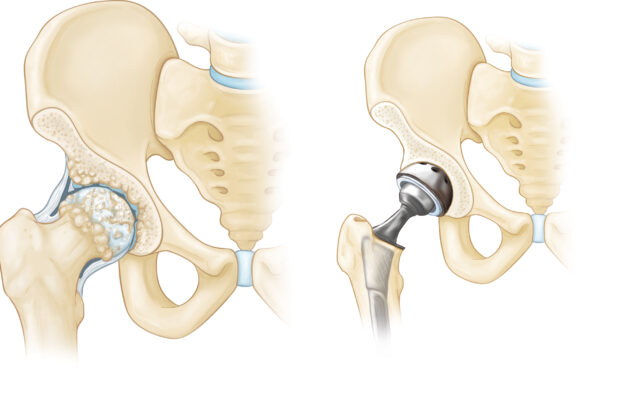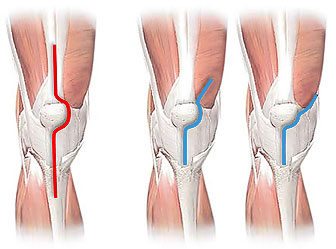Revision Total Knee Replacement: in joint replacements this is the most successful and commonly done procedure. In case a second surgery is required if the first knee replacement fails, then revision total knee replacement is done.
This revision requires complicated specialized intervention as it is an extensive surgery requiring specialised implants.
This revision may require partial replacement or removing and replacing all the three components and sometimes metal augments used to build bone around the knee for better stability. As usually longer and thicker stemmed implants are fitted inside the bone and the bone also may need grafting due to weakened bone.
Selection of patients for surgery is done:
- When the implant in imaging studies show visible loosening and wear, causing pain to the patient, also impacting the knee replacement functionality achieved from primary surgery. This can happen in young patients and also patients with excessive high impact lifestyle.
- Osteolysis condition in which the bone weakens can also lead to revision surgery. This primary can happen due to tiny plastic particles from first prosthesis accumulating near the joint and body’s immunity response attacking the healthy bone structure.
- Infection may develop in the artificial joint making it painful and stiff, affecting mobility. This may be done by debridement in which infection bacteria is cleaned out and plastic prosthesis replaced or implant may be entirely replaced. A antibiotic treated plastic spacer may be placed for some time and the surgery will be done in two parts to treat the infection completely.
- Knee becoming unstable may also call for a revision surgery when the knee is affected due to disease or damage/injury to surrounding ligaments causing instability and swelling.
- Stiffness in knee joint due to excessive tissue build up around the operated area post surgery causing disruption in joint movement.
- Fractures when occur around the prosthesis called the periprosthetic fracture may require knee replacement revision.
Pre surgery Evaluation consists of various steps to ensure a beneficial surgery which includes taking of detailed medical history, comprehensive physical examination, and diagnostic imaging tests like x-rays, MRI, CT scan. Patient’s fitness is primary to recovery post operation. Specific assessment would be done for patients with heart problem, etc. To rule out infection blood tests may also be done and also with aspiration the knee joint fluid would be assessed for infections. Doctor will also advise you on post operative home care arrangements as post surgery the patients mobility is affected.
Surgical process: the patient is commonly admitted one day prior or on the same day as surgery. Pre – anaesthetic check up is done on admission. Revision total knee replacement surgery lasts from 2-3 hours. Surgeon makes an incision along the lines of the primary incision to access the prosthesis and the incision may be longer than the original cut. To reach the prosthesis, surgeon moves the kneecap, tendons and exposes the knee joint and subsequently examines the surrounding soft tissue/ligaments for infection and asses the prosthesis/parts which need replacement. This is a complex procedure as the previous implants and the cement if used has to be carefully removed to prevent any damage to the surrounding tissue. Once removed the bone structure is prepared for secondary implants and insertion of specialised implants is done with repair of surrounding tissue. Post surgery the patient is moved to a recovery room and placed under monitor.
Complications or risks include, blood clots, bleeding, poor wound healing, bone fracture, nerve vessels damage, infection.
Recovery: Post operation, the patient stays for several days at the hospital and treated for pain management, given physiotherapy and put on medication to prevent complications. Recovery management continues at home with specific instruction from doctor for wound care, physiotherapy, medication for preventing infections.



